by Diane Miller and Basya Petnick
Hilary Parsons
Shin Ke Rei Gen
Deep River―Spiritual Source
January 1, 1949 – August 19, 2017
Lin Zenki
Kan Shin Zen Ki
Generous Heart―The Whole Works
October 28, 1951 – August 28, 2017
Hilary Parsons and Lin Zenki were passionate women. They were lovers―loving each other, their community of friends, and their lives in practice. They were also fighters―New Age warriors fighting for social justice as nurses, political activists, and as practitioners.
Hilary’s practice began with martial arts and then evolved when she became a student of Ruth Dennison. Lin’s practice began in her college years with Francis Cook at UC Riverside. It was the night shift on an oncology ward where Hilary and Lin’s relationship began and so did their joint devotion to the dharma. They lived and practiced together at San Francisco Zen Center for many years.
Their nursing careers followed the course of the AIDS epidemic. Lin was one of the first nurses to care for patients with this mystery disease. She, along with other UCSF nurses, were recognized in And the Band Played On: Politics, People and the AIDS Epidemic, a book by Randy Shilts that was made into a film. Lin later worked with HIV prevention programs for heroin addicts. But as her health weakened and she could no longer do hands–on nursing care, Lin transitioned to a case management program for patients with complex medical problems. However, taking her difficulties in stride, she kept working and learning and earned her MSN in nursing from Holy Names University.
Hilary was an HIV hospice nurse in the San Francisco Department of Health’s home care program, who was frequently acknowledged for both her skill and devotion to her patients. The director of health once commented that what he learned about nursing care as a young resident he learned from Hilary. She was also a union activist, fighting for her fellow nurses with the same fierce advocacy she gave her patients. For both Lin and Hilary nursing was their path of practice.
After many active years, their lives and their life together changed dramatically when Lin became severely disabled and stopped working. Hilary, however, continued to work as a caregiver for several years. In 2012, they retired and moved to a continuing care community in Washington State, taking up their new life close to old dharma friends from their residential practice days at Zen Center. Their early retirement years were a balance of rest and engagement, but in time, each in her own way saw their world get smaller because of fatigue, illness, and pain.
This year―2017―was a turning. It seemed Lin could not ever be comfortable. She developed sores that didn’t heal. She was growing more dependent. Hilary had fibromyalgia and chronic fatigue those last few years and then was diagnosed with an aggressive breast cancer in March. But as hard as that last year was they were able to return to their SFZC sangha. The online class and study group taught by David Zimmerman brought them back home. The pains were still there but the practice zeal had returned.
Hilary’s cancer was dreadful, even though in the end she didn’t label it that at all. Twenty minutes before Hilary died she wrote: I have generally found these last 2.5 months were not so difficult and have had many happy moments and unexpected intimacies and a great deal of kindness coming my way. People are so different. It’s hard to really understand. Her keen mind was alert and investigating and synthesizing until her very last exhalation. She died suddenly. A clot unexpectedly took her life in the midst of her preparations to leave the hospital and return to her life with Lin.
The days after Hilary’s death Lin suffered so. Her dying began with Hilary’s death. But for a brief moment she found her priest voice at Hilary’s memorial. She chanted “Homage to the Perfection of Wisdom” in a voice that came from the very core of her being. She gave the eulogy, and she touched the hand of each friend with a gift of one of her handmade malas as a token of the day. In truth, she was saying goodbye. Several hours after the memorial she was in the emergency room. When she could talk she said she was entering a karmic river and she was ready. She died soon after.
―Diane Miller
While it sometimes happens that when a partner in a very close partnership dies, the surviving partner might not live long, the interval between Hilary Parsons’ death and Lin Zenki’s death was merely nine days. Those who knew them were deeply shocked.
Hilary and Lin lived in Zen Center’s big brick Julia Morgan building at 300 Page Street for about ten years―mid-eighties to mid-nineties. Lin came to Zen Center on a Harley Davidson, a gift she bought herself when her first marriage ended. Hilary came to stay about two years later.
My heart and mind are flooded with memories: Tenshin Anderson Roshi ordained Lin. I remember her priest ordination ceremony. I remember Lin’s first bald head. I remember her trying to find a path in her new life of “clouds and water.” It wasn’t easy.
Both Lin and Hilary were students seriously engaged in study and practice. Hilary had great organizational skills and was highly verbal and communicative. She was a work leader for whom the floor had to literally shine. And shine it did. The building was immaculate and welcoming through the power of her dedication, and the courtyard gardens a work of art. When she was Ino, she was the kind of Ino who knew every word of every chant and every movement of every ceremony and where every student was at every hour of the day. Forget about cutting zazen or skipping out on a period of sesshin. She would notice immediately. She would hunt you down and want to know, “Why aren’t you in the zendo?” Her words were a genuine question, not an accusation: Really, why aren’t you there?
I can see them both and each in my mind’s eye. I see Hilary with her short, straight red hair striding through the halls in her lay sitting robes and her heavy white sneakers, which she had to wear instead of sandals because she had foot problems. She was the only woman in the universe who could actually look good in an outfit like that―somehow it suited her.
I see Lin in the years before her ordination serving as doan (timekeeper) for zazen, gracefully opening and closing the curtain to the zendo, her every bell for sitting and service ringing out perfect and true. She never missed. She generously taught many other students how to perform in this and other practice roles.
I can’t remember why Lin became angry with one of her teachers and returned her priest robes. I can’t remember the reason but I remember the robes; I remember seeing Lin’s perfectly folded and beautifully hand-sewn robes (she was a genius at design and handcrafts) on a shelf in the abbots’ study, now looking like a pile of corpse-like cloth. It was a sad day and we―all the resident practitioners―felt it.
Lin and Hilary were women of much data, knowledge, wisdom, and many opinions. They were quick to laugh―each had a great sense of humor―but they were also quick to anger and express their objections to anything they thought was unfair or wrong. They changed teachers several times. They spoke out when others did not. They defended themselves, one another, and anyone else they thought had been treated unfairly.
They often had dinner at a large round table in the dining room and were joined, especially in the days of the AIDS epidemic, by those seeking help with information about HIV/AIDS, new treatments, referrals, and homecare. They would spend hours listening and talking with those who sought their help. They were always available for anyone in genuine need.
Lin had sciatica during the months she was shuso (head student). I sat next to her during the seven-day sesshin that concluded her shuso practice period, and I felt her breathe through the pain of each and every moment of every sitting period. On the last day when we returned to the zendo after a break, someone had placed beautiful leaves on Lin’s cushion, a recognition of her immense effort.
After hearing the news of both of their deaths, I contacted Gaelyn Godwin, one of our dharma sisters, who is now the head teacher at the Houston Zen Center and told her that Lin and Hilary had both died. She was shocked and sad as we all are in this time of a great and sudden loss.
After a moment’s reflection, Gaelyn said, “Lin and Hilary were such strong women―their strength made us strong.”
Brown leaves on a black cushion
The true sound of a bell
A gleaming entrance way
Our deep thanks
Our sad hearts
The white-light call to wakefulness
Our continuing sangha strength
―Basya Petnick


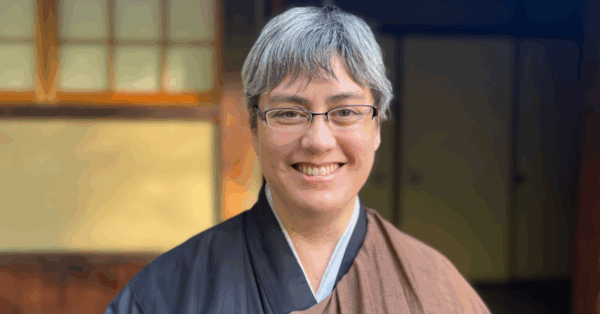
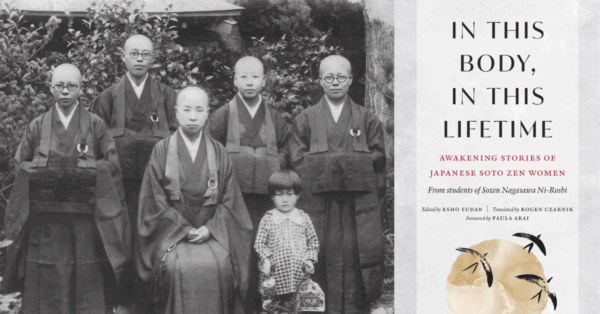
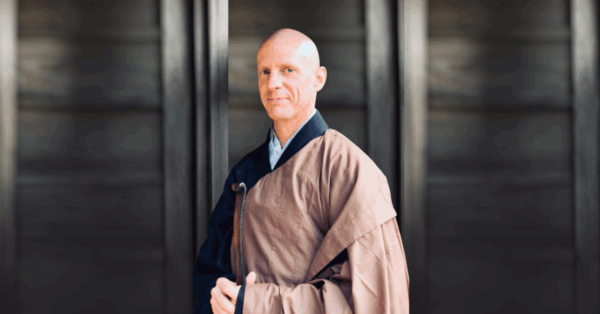
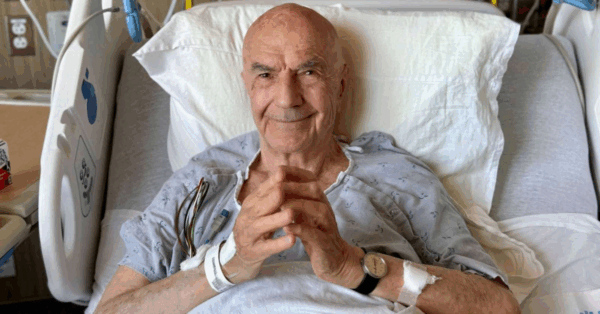
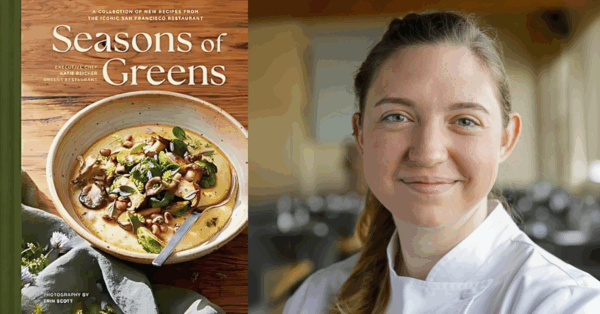
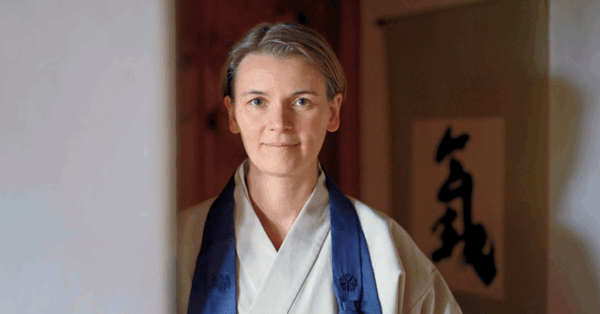
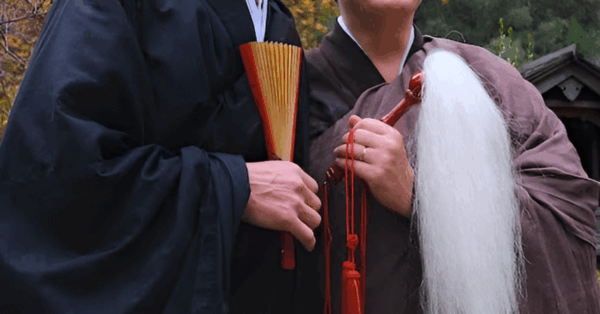
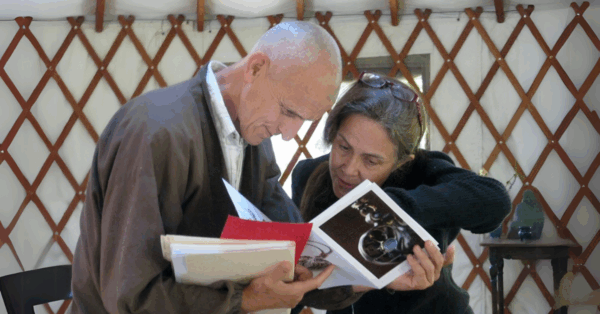
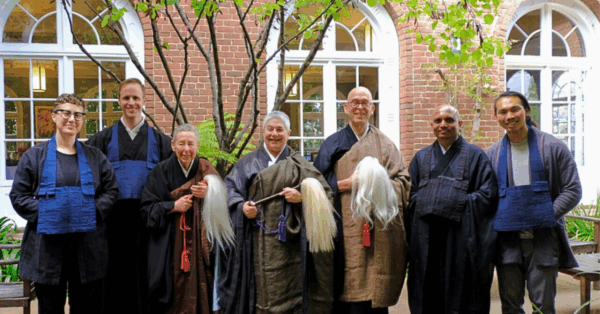
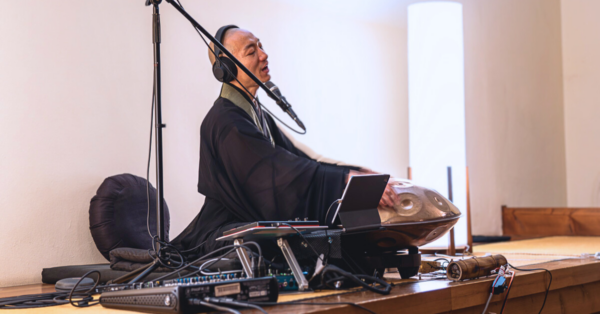
Thank you so much for such a nice history of my cousin and her partner. I was very young when Lin left the family. I’m happy that she found happiness in her life with Hilary. It’s always been a family mystery of what happened to Lin. I know it wasn’t easy being a part of our family. I know some family members were resentful of her decision to leave but I kind of understood. Now that I’m older I understand better. I wish I had a chance to know her but that wasn’t to be. To her new family, her real family, I thank you so much for taking her into your hearts and making her a part of your life. I hope she was happy. You have my deepest and sincerest sympathies for your loss of both Hilary and Lin and I can wish you nothing but happiness in your future.
Before I was a Zen student, I practiced Vipassana. My first long retreat — five days? seven days? — was with Ruth Dennison in Joshua Tree. Hillary was the Ino and Lin was the Tenzo (though they didn’t use those titles). Sitting for most of the day and night in silence and living in a dorm with a bunch of other women with outhouses and group showers was so hard for me that by the end of the week I broke down completely. While the rest of the group was in the meditation hall, I went into the kitchen, sobbing. Lin was there, baking us biscuits for breakfast. She received me without judgment and let me cry into her shoulder. We talked for a while. She said it would be all right if I left the retreat early but then said some of the most useful words I’ve ever heard. Lin said “It would be a shame if enlightenment came and you weren’t on your cushion to greet it.” I went back to the zendo, of course, and finished the retreat, and one thing led to another and I am still sitting on that cushion just in case. After that I saw Hillary and Lin when they visited Zen Center for events, and always felt such a rush of gratitude to them. May they continue on their joined path with joy forever.
Hillary was a tremendous inspiration to me when she was ino at the San Francisco zen center. She inhabited that position as thoroughly as I’ve seen anyone inhabit anything. Her competence was monumental and I felt completely cared for, as I think pretty much everyone did. When her term of service ended I remember thinking, “Wow, that’s a hard act to follow,” but of course it wasn’t an act at all – it was Hillary. Safe travels, Lin and Hillary.
Diane and Basya, thank you for these beautiful remembrances of Lin and Hilary. I got to live and practice alongside them at City Center for most of 1989, and saw them at events afterward. They were fiery, warm, and radiant; they encouraged and inspired me. I am sad for the loss of them both, not really surprised that Lin’s death followed so closely upon Hilary’s, and grateful for the ways they touched my life. Long may they ring!
Thank you for this beautiful and balanced celebration of Hilary and Lin. Each had fire in their belly and gentleness in their heart. String back soft front. I only learned of their deaths this evening. I knew Hilary better, as we shared hospice work. She worked for Visiting Nurses and Hospice of San Francisco when I directed the Zen Hospice Project. I asked that Hilary be assigned as the primary nurse at our Guest House Residence. And, for a time, we accompanied many people through the dying process together. Some died gracefully finding love and forgiveness often in the company of important strangers. Others left skid marks, dragging their feet in total resistance. And some turned toward the wall in withdrawal and hopelessness. Hilary had a capacity to be with each person’s way without judgment. She was a skillful nurse, a fierce advocate and frequently a patient and accepting presence, when others had pulled back in frustration. I didn’t always agree with her choices but I trusted her. There was a mutual respect. That allowed Lin to open herself to me from time to time. We spoke unflinchingly and unsentimentally about death on a number of occasions.
I am grateful.
Reading this in March of 2022… about 5 years after hilary and lin passed. thank you so much for writing about them. they were good friends in the 80’s. i lived w Hilary before she met lin and moved into Zen Center. Lesbians and Sangha sisters. Fierce is a good word for them both. I remember when hilary first started meditating. It was Vipassana w Ruth Denison, women’s retreats in the high desert of so. california… like a duck to water. and then meeting lin and falling in love and moving into the Zen Ctr in her own room and then together. for years there… and then moving out because of i can’t remember why, but sexism was a piece of it… and living in a condo in Berkeley and staying connected w Berkeley Zen Ctr… and their lives happening together. Both amazing wimmin, honorable, full and deep lives they had. May their spirits continue to flow in the Universe.
best to all, rhea
I am reading this in August of 2023. I am so sad that Hilary died too young, but very glad to find out more about her life. I worked on the HIV team at VNH in the 90’s with Hilary and we often shared patients. I was a social worker on the team. I didn’t know of Hilary’s experience as a Zen practitioner. I was not practicing at the time, I am now. Hilary was one of those amazing nurses that I loved working with. She had skill, diligence and vitality. We complimented each other and had fun during the saddest of times. One memorable visit we did together, involved meeting with a women with HIV in a SF housing housing project and Hilary working patiently with her cognitively disabled son to train him to help his mother as best he could. During that visit and before I was able to do my social work assessment, there were gun shots out side and screams. We ran out and a girl of about 12 was hit by gunshot in her ankle in front of our patients home at a bus stop. Hilary provided first aide and I called 911. That visit is still so vivid. We were a team and we were able to do what was needed carefully and kindly, to help the young girl and and neighbors. Hilary told me what to do and I did it. It took me quite some time after that visit to be able to return to that housing project. I was scared. Hilary, however, was able to quickly return and do her good work. I never saw her again after she left VNH, but I sure do remember her. She was memorable.